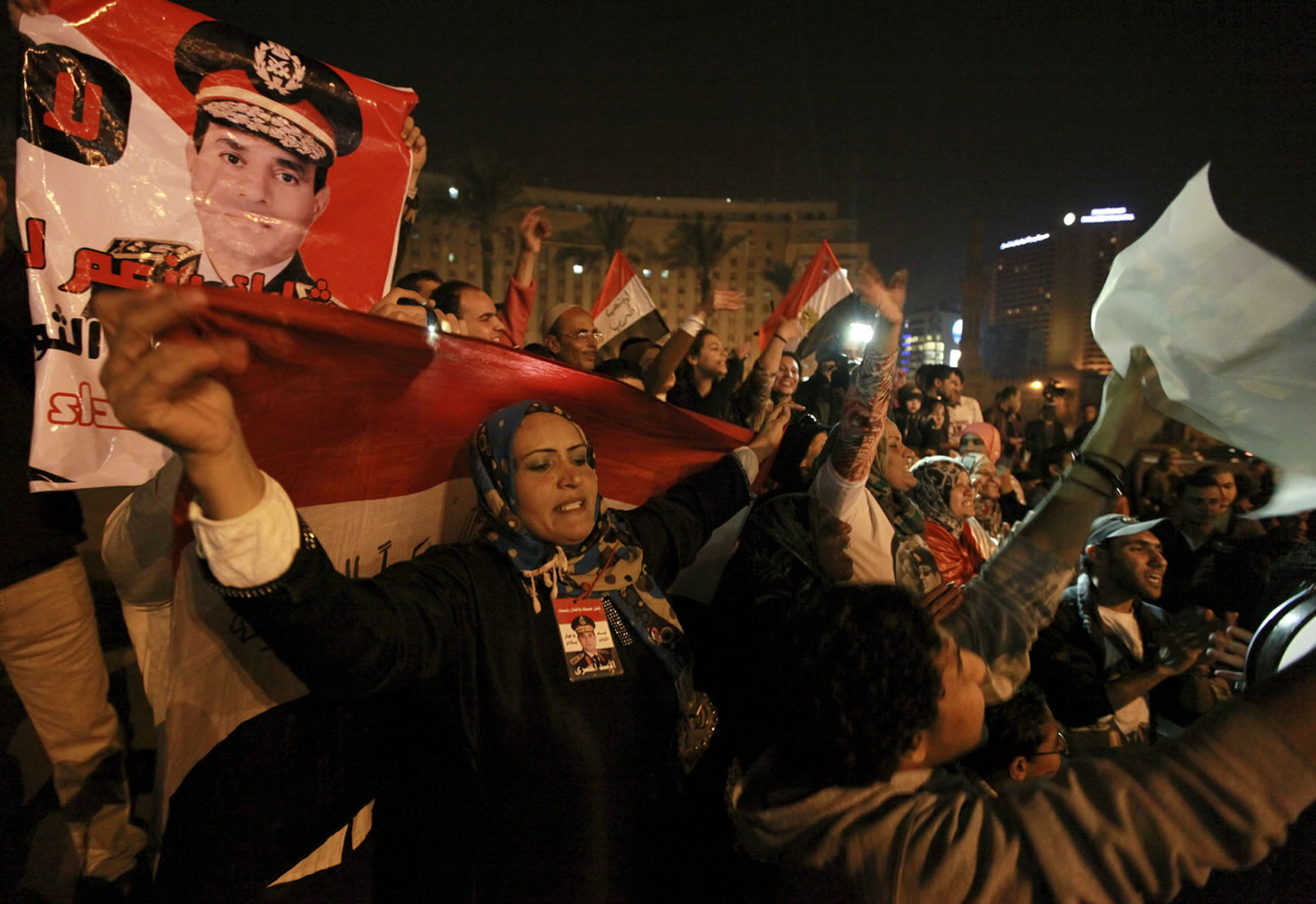CAIRO — Egypt’s government declared Saturday that a proposed new military-endorsed constitution has been approved by more than 97 percent of the voters who cast ballots in a two-day referendum on the document. More than 38 percent of the electorate turned out, the High Election Commission said.
But the overwhelming margin of victory and the turnout numbers immediately cast doubt on the result.
The United States issued a lukewarm acknowledgement of the vote, but no congratulations, with Secretary of State John Kerry reminding in a statement that “democracy is more than any one referendum or election.” The statement then listed the many criticisms international observers have made of the constitution, from the failure to include dissident voices in its drafting to the arrest of people who advocated its rejection.
“The United States urges the interim Egyptian government to implement those rights and freedoms guaranteed in the new constitution,” Kerry said. “The brave Egyptians who stood vigil in Tahrir Square did not risk their lives in a revolution to see its historic potential squandered in the transition.”
With government opponents largely in jail or otherwise sidelined, however, it was unclear whether questions about the outcome would change the country’s current trajectory toward rule largely by the military after July’s ouster of Mohammed Morsi, who had been the country’s first democratically elected president.
The government heralded the overwhelming support for the 247-article document as a sign of renewed patriotic fervor. In announcing the result, 19.5 million “yes” votes to 475,091 against, the commission urged an end to street protests that had become the primary way for unhappy Egyptians to demonstrate their concerns in the three years since the uprising against President Hosni Mubarak’s three-decade rule. The admonition seemed unnecessary, since the government decreed in November that demonstrations are illegal, unless they’d been approved in advance by the government.
“We must work very seriously and strive and remain firm as men,” said Nabil Salib, the head of the High Election Commission. “We must give demonstrations a break so that we can bring back Egypt’s position and greatness and bring back its security which will eventually lead to its economy’s improvement.”
The election commission’s pronouncement of the results is final; there is no appeal.
Statistically, the vote reaffirmed a government that has cracked down on opponents and promised a return to stability after three years and four different heads of state. The announced turnout surpassed the 32 percent who voted in 2012 on a proposed constitution during Morsi’s time in office. That document was approved with 63.8 percent of the vote; the military immediately suspended it upon seizing power in July.
That anything could pass so overwhelmingly in a nation marked by polarized politics raised the largest doubt, and the victory margin was even more notable given other votes since the 2011 uprising, where a divided electorate was the norm. Morsi, for example, won the presidency in 2012 over former Mubarak official Ahmed Shafik by a margin of 52-48.
Determining how accurately the announcement actually reflected the balloting was made difficult in part because this election was not as well monitored as past votes.
In all, there were 200 international monitors and 6,000 local monitors for 13,000 polling stations. At many polling stations, that meant there were no monitors throughout, including the ballot count.
And in the weeks leading up to the vote, opponents couldn’t call for voters to say no and couldn’t insult the military without fear of arrest in a country where many think that under the newest government, democratic processes have become a means to codify the return of a police state that millions rose up against when they forced Mubarak from office.
“There was no real opportunity for those opposed to the government’s roadmap or the proposed constitution to dissent. This constrained campaign environment made a robust debate on the substance and merits of the constitution impossible,” concluded Democracy International, a monitoring group that, with 80 observers here, provided the largest number of international monitors. It added, “The legitimacy of these processes is for the Egyptian people to decide.”
Many called the vote a referendum on the political future of Egypt’s strongman, Defense Minister Gen. Abdel-Fattah el-Sissi, who’s considered the top contender in the still-unscheduled presidential elections.
The military hailed the vote, with army spokesman Ahmad Mohamed Ali saying the referendum “confirms Egyptians are the first free population in recorded history.”
For some, the results suggested either a rigged process or a nation that had undeniably rejected Morsi’s brand of governance. Provinces where Morsi won his largest margin in the 2012 presidential election also delivered the most “no” votes against the constitution. But in no province did the “no” vote surpass 5.6 percent.
In Fayoum province, which sits just south of Cairo and is one of Egypt’s most impoverished and presumed Muslim Brotherhood strongholds, 70 percent voted for Morsi in 2012, and 89 percent approved the Morsi-era constitution that December. This time, 96.7 percent voted for the military-proposed constitution.
In the restive North Sinai, where the military has been waging a war against insurgent elements and residents alike since Morsi’s ouster, the constitution passed with 94.4 percent of the vote.
In announcing the results, Salib said Egypt had its military to thank in part for its new direction.
“Remember the heroes of your army. They have restored hope in our future and protected Egypt,” Salib said.



